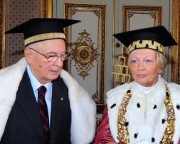7. 04. 2010| Eventi e convegni
Donald E. Pease and “The New American Exceptionalism”
On the 16th of March, Donatella Izzo – professor of Anglo-American Literature at “L'Orientale” university – introduced professor Donald E. Pease, author of the book “The New American Exceptionalism”, Chair of the Humanities at Dartmouth College and Director of the Futures of American Studies Institute.
Professor Pease describes his perspective on the new American exceptionalism as a form of the work of state fantasy, focusing on a transition period during American history: from the end of the cold war to the election of Barack Obama.
Throughout the cold war, the concept of American exceptionalism has been adapted for promoting and reinforcing U. S. politics. At the breakdown of the state of fantasy that had regulated Americans’ relationship to the political order, a variety of state fantasies emerge. G. H. W. Bush produces an external world opposed to “homeland security” in order to regulate internal questions. Fulfilling his father's fantasy about global war terror, G. W. Bush introduces a whole new fantasy of American exceptionalism in which the State declares itself an exception to the law, specifically to the Law of Nations. Foregrounding such new exceptionalism, Bush administration asks the citizenship to agree with it and with all the new relations it ensues: citizens opposing this view are considered as non-Americans, as terrorists. As a result, G. W. Bush produces a new transformation in Americans’ self-representation in order to unify internal antagonisms against an external enemy, thus creating an alternative fantasy and reproducing the cold war logic. At last, during presidential election, Barack Obama adopts a new fantasy, the alternative order: the movement was calling for new constitutions, but Obama did not run on political issues and did not represent a specific change; nevertheless, the fantasy he used fulfilled his will.
In this perspective, according to the definition of professor Jacqueline Roses, fantasy – far from being the antagonist of public, social, being – plays a central, constitutive role in the modern world of states and nations.
Professor Pease seeks to call attention to the reflection on the state of fantasy in modern world, because fantasy is a dominant pattern in the construction of national identity. In other words, if you stop thinking about fantasy and exceptionalism, you would stop thinking about contemporary politics.
Parole chiave | tags
American Exceptionalism Donald E. Pease Donatella Izzo Fantasy
Trackback | url dell'articolo
http://magazine2.unior.it/trackback/852


Invia nuovo commento